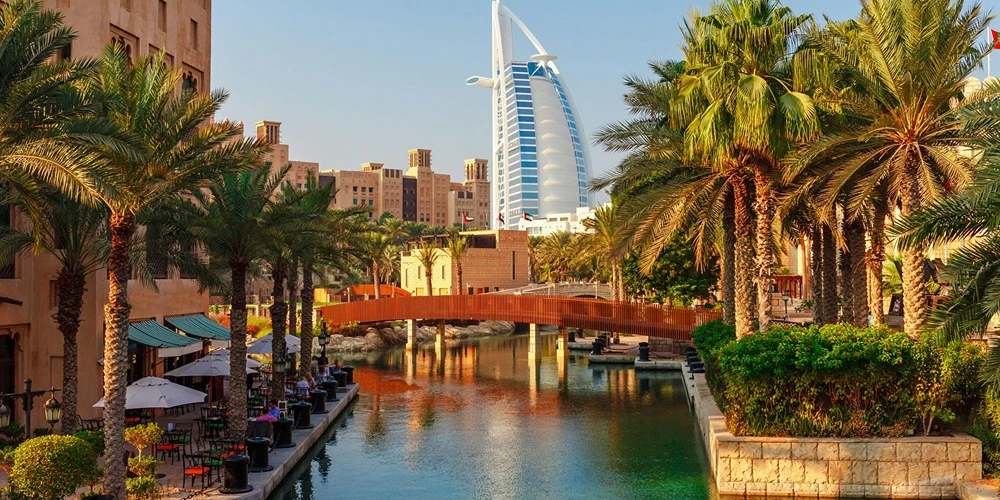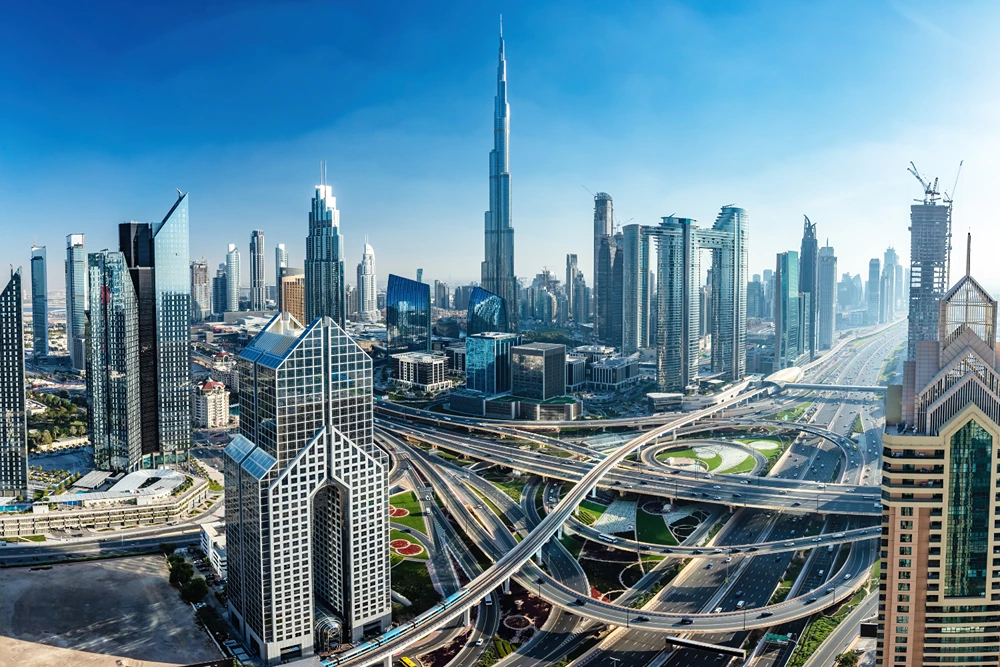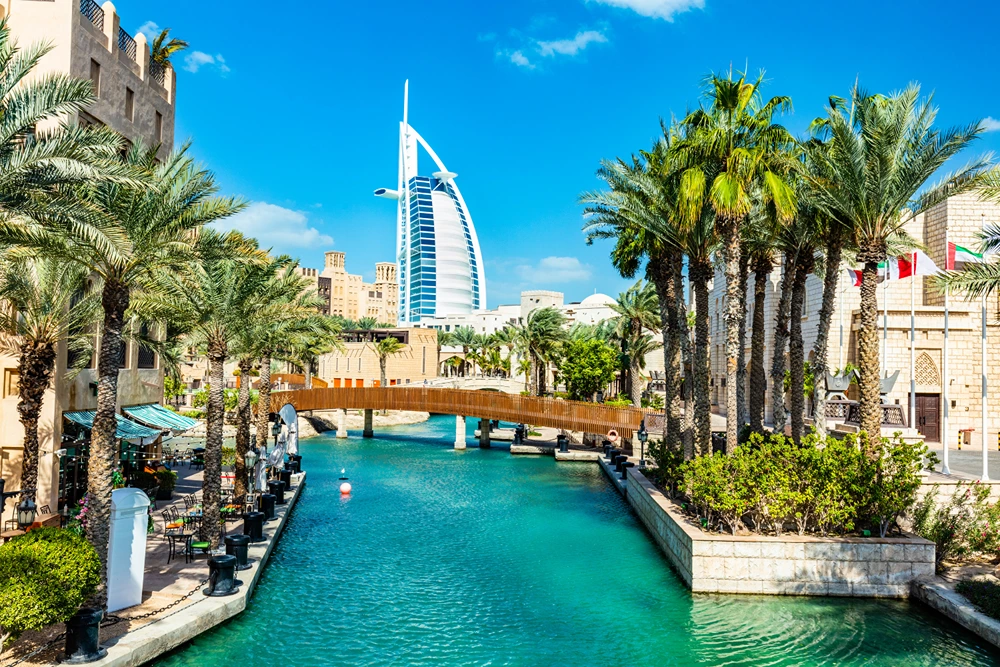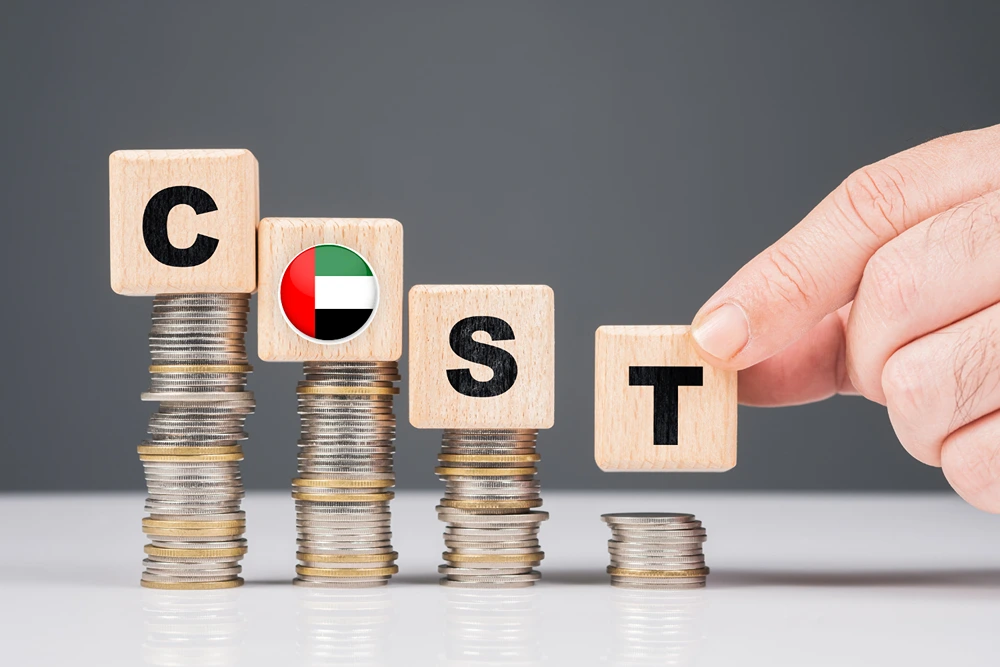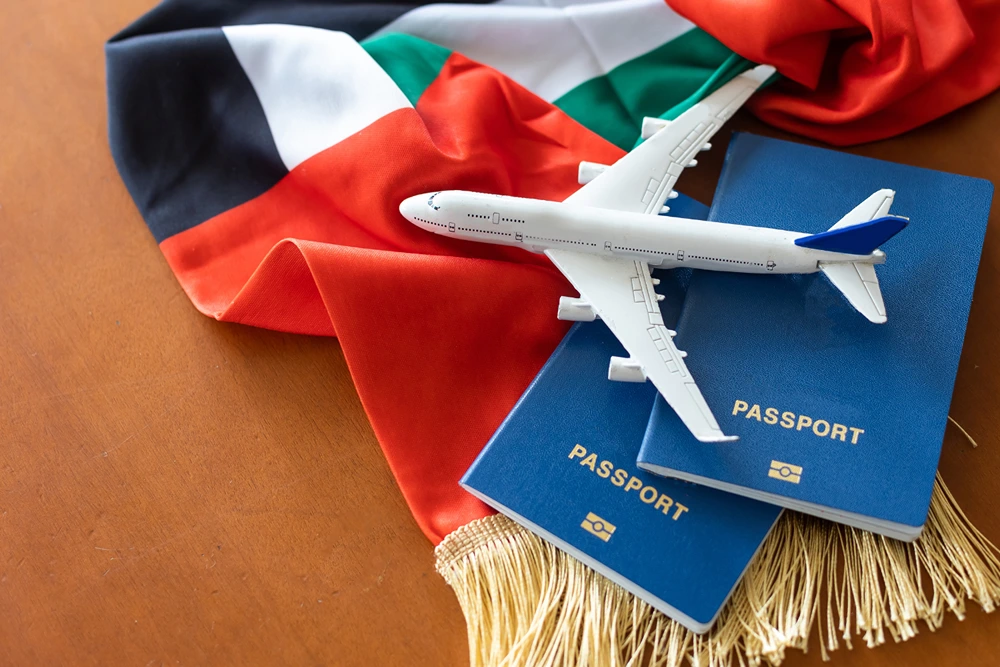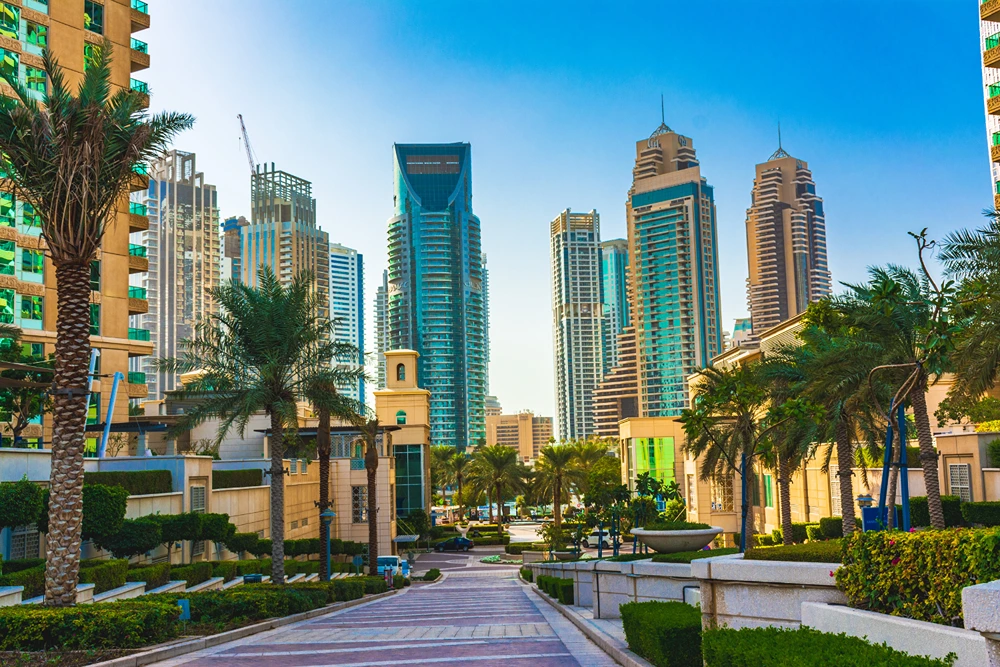The United Arab Emirates (UAE) is a captivating destination that seamlessly blends modernity with rich cultural heritage. Known for its:
- Futuristic skylines
- Luxurious amenities
- Traditional Arabian hospitality
- World-class attractions
Travel Resources
Plan your trip to the UAE with ease using these helpful resources.
- Cheapest flights to United Arab Emirates: Find budget-friendly options to major airports like Dubai (DXB) and Abu Dhabi (AUH). Use flight comparison tools for the best deals.
- Insure your trip: Ensure a worry-free visit by getting travel insurance that covers your needs.
- Rent a car in United Arab Emirates: Explore the UAE at your own pace with convenient car rental options.
- Book your tours: Discover exciting tours and experiences to make the most of your time in the UAE.
- Essential things to pack: Prepare for your adventure with these essential items to pack for your trip to the UAE.
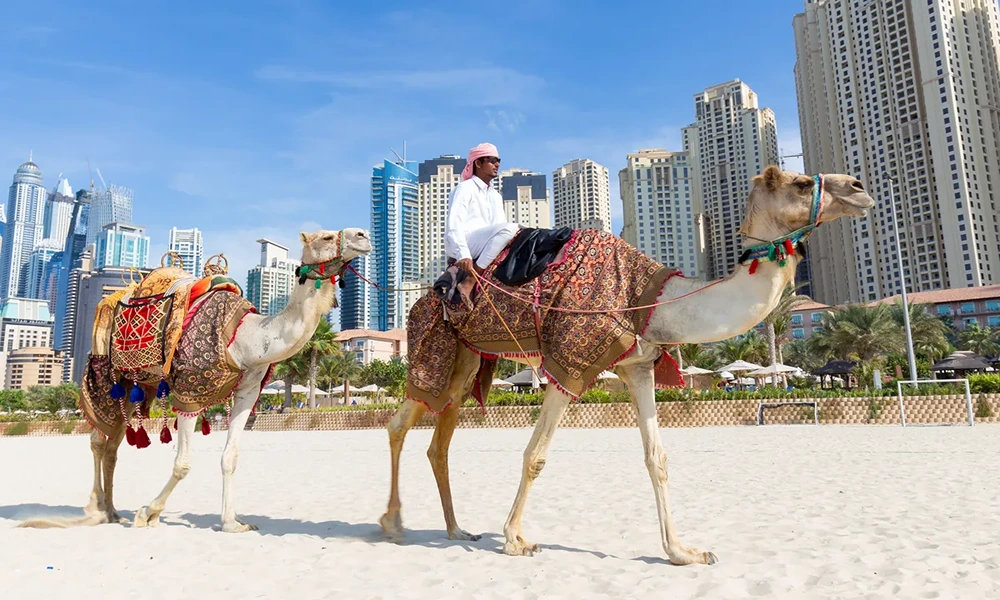
Some History First
The UAE’s history is a fascinating journey from ancient civilizations to a modern powerhouse:
- Ancient times: Evidence of human habitation dating back 125,000 years.
- Bedouin heritage: Nomadic lifestyle shaped the region’s culture for centuries.
- Maritime history: Thriving pearl diving and trading industries.
- British protectorate: From 1820 to 1971.
- 1971 federation: Seven emirates united to form the UAE.
- Oil discovery: Transformed the region’s economy and landscape.
Visit museums like the Etihad Museum in Dubai or Qasr Al Hosn in Abu Dhabi for in-depth historical insights.
United Arab Emirates Today
The modern UAE is a global hub of innovation and cultural exchange:
- Architectural marvels: Home to the world’s tallest building, the Burj Khalifa.
- Economic powerhouse: Diversified economy beyond oil, focusing on tourism, finance, and technology.
- Cultural melting pot: Over 80% of the population are expatriates.
- Sustainability initiatives: Hosting Expo 2020 Dubai and developing sustainable cities like Masdar City.
- Art and culture: Louvre Abu Dhabi and numerous galleries showcase both traditional and contemporary art.
Is United Arab Emirates Safe?
The UAE is renowned for being one of the safest countries for tourists and residents alike.
Key safety aspects:
- Low crime rates: Especially for tourists and in public areas.
- Strict laws: Help maintain public order and safety.
- Modern infrastructure: Well-maintained roads and public spaces.
- Advanced healthcare system: High-quality medical facilities available.
Tips for a safe visit:
- Respect local customs and dress codes, especially during Ramadan.
- Be mindful of public behavior norms.
- Take usual precautions against petty theft in crowded areas.
Where is United Arab Emirates?
The UAE is strategically located in the eastern part of the Arabian Peninsula:
- Borders: Oman and Saudi Arabia
- Coastline: Persian Gulf and Gulf of Oman
- 7 Emirates:
- Abu Dhabi: The largest emirate and capital of the UAE
- Dubai: Known for luxury shopping, ultramodern architecture, and vibrant nightlife
- Sharjah: Cultural capital with numerous museums and galleries
- Ajman: Smallest emirate known for its beautiful beach
- Umm Al Quwain: Rich in natural beauty and wildlife
- Ras Al Khaimah: Features mountains, beaches, and desert landscapes
- Fujairah: The only emirate fully on the Gulf of Oman, known for snorkeling and diving
Latest Articles
From The Area
What is the Best Time to Visit United Arab Emirates?
The best time to visit depends on your preferences and planned activities:
- Winter (October to March):
- Ideal weather with temperatures between 20°C to 30°C (68°F to 86°F)
- Perfect for outdoor activities and sightseeing
- Peak tourist season with higher prices
- Summer (April to September):
- Very hot and humid, with temperatures often exceeding 40°C (104°F)
- Great for indoor activities, shopping, and water parks
- Lower prices and fewer crowds
Tip: Consider visiting during shoulder seasons (April-May or September-October) for a balance of good weather and lower prices.
How to Get to United Arab Emirates & Around
Navigate transportation options within the UAE efficiently:
- Metro: Dubai Metro is efficient for getting around the city
- Taxis and ride-hailing: Widely available and relatively affordable
- Buses: Intercity buses connect major cities
- Car rental: Good option for exploring multiple emirates, drive on the right side
- Water taxis: In Dubai, abras (traditional boats) cross Dubai Cree
Things to Do in United Arab Emirates
The UAE offers a diverse range of experiences:
- Sightseeing: Burj Khalifa, Sheikh Zayed Grand Mosque, Palm Jumeirah
- Desert adventures: Dune bashing, camel rides, stargazing camps
- Cultural experiences: Visit traditional souks, attend a falconry show
- Theme parks: Ferrari World, Warner Bros. World, Aquaventure Waterpark
- Beaches: Relax on pristine beaches in Dubai, Abu Dhabi, or Fujairah
- Shopping: Explore massive malls or traditional markets (souks)
- Museums: Louvre Abu Dhabi, Dubai Museum, Sharjah Museum of Islamic Civilization
- Outdoor activities: Hiking in Hatta, kayaking in mangroves, skydiving
Where To Stay In United Arab Emirates
The UAE offers accommodation for every budget and preference:
- Luxury hotels: World-famous brands offering opulent experiences
- Beach resorts: Perfect for a relaxing holiday
- Boutique hotels: Unique, design-focused options
- Serviced apartments: Great for families or longer stays
- Desert resorts: Immersive experiences in the Arabian desert
- Budget hotels and hostels: Affordable options in major cities
Tip: Book in advance for the winter high season and consider staying in Sharjah or Ajman for more budget-friendly options near Dubai.
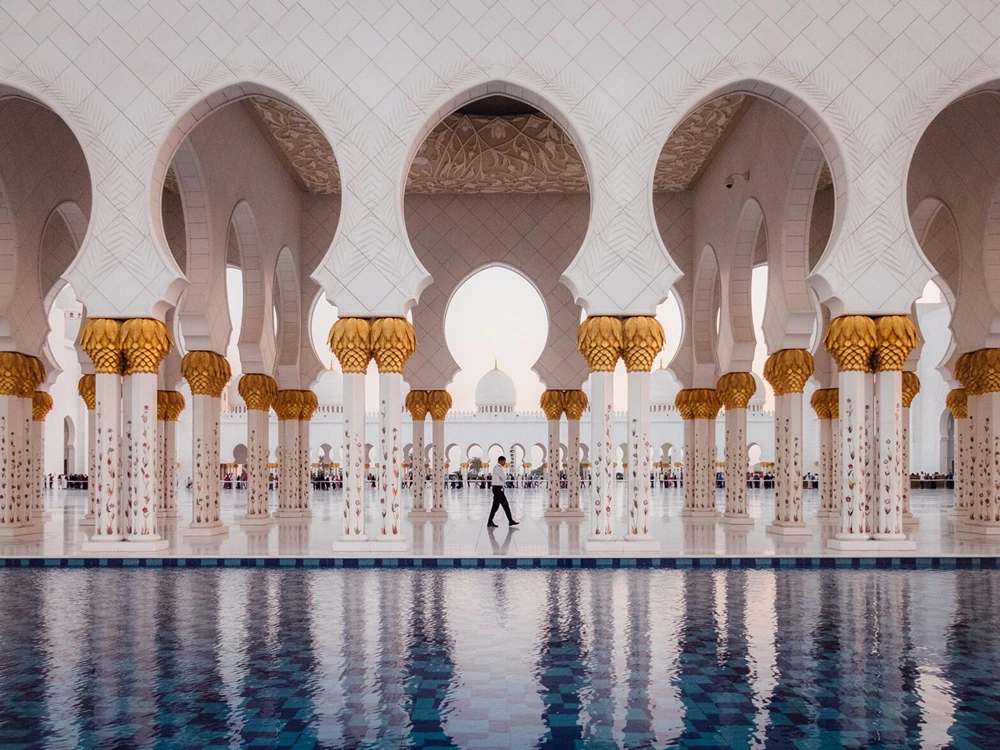
What To Eat In United Arab Emirates
UAE cuisine reflects its cultural diversity:
- Emirati dishes:
- Al Harees: Wheat and meat slow-cooked in a clay pot
- Al Machboos: Spiced rice dish with meat or fish
- Shawarma: Popular street food of grilled meat in pita bread
- Hummus and Falafel: Common Middle Eastern appetizers
- Camel meat: Traditional delicacy, often served in high-end restaurants
- Dates: A staple in Emirati culture, often served with Arabic coffee
- International cuisine: From fine dining to street food, covering all global cuisines
Don’t miss: Trying a traditional Arabic coffee ceremony.
Entry & Exit Requirements
Requirements vary based on nationality:
- Visas: Many nationalities receive visa on arrival, others need to apply in advance
- Passport: Must be valid for at least six months beyond your stay
- Return ticket: Proof of onward travel may be required
- Health requirements: Check for any current health-related entry requirements
Always check the latest requirements with the UAE government portal or your nearest UAE embassy.
What To Pack For Your Trip!
Essential items for your UAE adventure:
- Lightweight, modest clothing: Respecting local culture is important
- Sunscreen and sunglasses: Protection against the strong desert sun
- Swimwear: For beaches and hotel pools
- Comfortable walking shoes: For exploring cities and malls
- Light jacket or shawl: For cool evenings or heavily air-conditioned indoor spaces
- Universal power adapter: UAE uses Type G sockets (230V)
- Refillable water bottle: Stay hydrated in the hot climate
- Conservative outfit: For visiting mosques or traditional areas
Remember: Dress modestly in public areas, especially during Ramadan.
FAQs
Get answers to commonly asked questions about visiting the United Arab Emirates:
Visa requirements vary based on nationality. Check with UAE authorities or embassies for specific details.
The currency used is the Emirati Dirham (AED). Currency exchange services are widely available.
Yes, the UAE is known for its safety and low crime rates. Respect local laws and customs for a trouble-free visit.
Respect local customs such as modest dressing, avoiding public displays of affection, and observing Ramadan customs.


